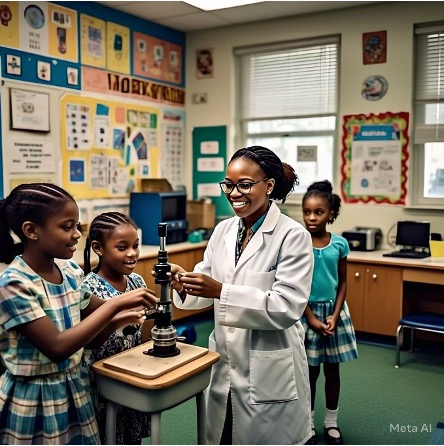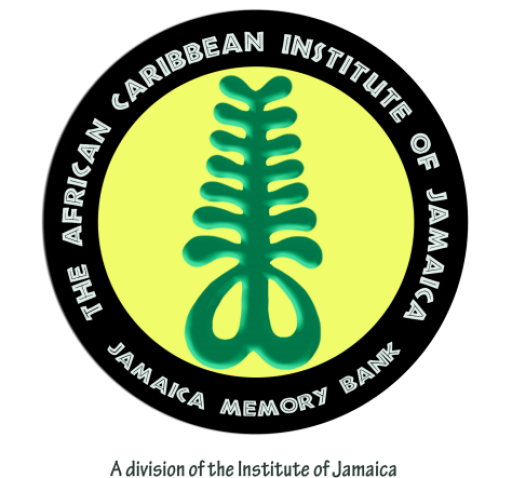Empowering Women and Girls in STEM: A Jamaican Perspective
By Georgette McGlashen-Miller, Research Officer, ACIJ/JMB
INTRODUCTION
As the world celebrates the International Day of Women and Girls in Science, Jamaica joins in recognizing the critical role that women and girls play in Science, Technology, Engineering, and Mathematics (STEM). The African Caribbean Institute of Jamaica/Jamaica Memory Bank (ACIJ/JMB) acknowledges the importance of empowering women and girls in STEM, aligning with its mandate to research, document, and promote the history and culture of African people in Jamaica and the Caribbean. This article explores the current landscape of women in STEM, with a focus on Caribbean women and Jamaica’s efforts to increase female participation in STEM fields.

CURRENT STATE OF WOMEN AND GIRLS IN STEM IN JAMAICA
According to “Your Commonwealth: The Youth Perspective” women are underrepresented in STEM, especially those from ethnic minority groups. Amidst this, the United Nations through Sustainable Development Goals 5 seeks to “achieve gender equality and empower all women and girls”, by inclusion in STEM skills training in schools. Despite these efforts to promote STEM education, women and girls in Jamaica remain underrepresented in these fields. This may be due to cultural issues around gender roles and occupation and career choices.
Additionally, socioeconomic situations are a factor, when considering tuition at higher education level. Data from the Jamaican Information Service shows the Honorable Daryl Vaz, Minister of Science, Energy and Technology, citing statistics from the United Nations Educational, Scientific and Cultural Organization (UNESCO), confirming the underrepresentation of women and girls in science, with less than 30 per cent of the world’s researchers being women (Sterling). In “Cracking the Code: Girls and Women Education in Science, Technology, Engineering and Mathematics (STEM), it is noted that “only 17 women have won a Noble Prize in Physics, Chemistry or Medicine since Marie Currie in 1903, compared to 572 men.” (UNESCO Digital Library). The data further states that “too many girls are held back by discrimination, biases, social norms and expectations that influence the quality of education they receive and the subjects they study.”
CHALLENGES FACING WOMEN AND GIRLS IN STEM IN JAMAICA
Women and girls in STEM in Jamaica encounter significant barriers, including limited access to resources and technology. Many schools, particularly in rural areas, lack modern laboratories, up-to-date textbooks, and digital tools necessary for effective STEM education (UNESCO, 2017). Despite the disruptions caused by the COVID-19 pandemic and the shift to online schooling, many schools across Jamaica still lack sufficient technology to engage meaningfully in STEM. For example, some traditional high schools and private schools funded by strong alumni may have equipment such as Bunsen burners, microscope and so on; while rural schools may only have video technology to watch the activities. This disparity reduces opportunities for hands-on learning and practical experience, making it harder for young women to compete in higher education and STEM careers.
Further, stereotypes and biases continue to discourage female participation in STEM fields. From an early age, girls are often steered towards traditional “feminine” careers, while boys may be encouraged to explore science and technology (Blickenstaff, 2005). These biases persist in classrooms and workplaces, as well as among social classes, where women in STEM face higher scrutiny and are expected to prove their competence more than their male counterparts.
The lack of role models and mentors further limits the aspirations of young women interested in STEM. With fewer visible female scientists, engineers, and technologists in Jamaica, girls have fewer opportunities to see themselves represented in these fields (Gadsden et al., 2021). Mentorship programs remain scarce, leaving young women without guidance on navigating the challenges of STEM education and careers.
CELEBRATING JAMAICAN WOMEN IN STEM
Ayanna T. Samuels, an Aerospace Engineer, Technology Policy Specialist, and International Development Professional, has been a longstanding advocate for gender equity in STEM. A trailblazer in her field, she holds three degrees from the Massachusetts Institute of Technology (MIT): a Bachelor of Science in Aerospace Engineering with Information Technology and two Master of Science degrees in Technology Policy and Aerospace Engineering. Notably, she was the sole Jamaican admitted directly into MIT’s Class of 2002 and 2005. She also made history as the first Black woman since 1972 to earn a Master’s in Aerospace Engineering from MIT, highlighting both her exceptional achievements and the ongoing underrepresentation of women of color in STEM.

Despite the challenges women face in STEM, Jamaican women have made significant contributions to the field. Dr. Joy Spence, born in Manchester, Jamaica, became a distinguished chemist, who broke barriers as the first woman to become a Master Blender at Appleton Estate Rum (Appleton Estate Rum). Spence earned a First Class Honors degree from the University of the West Indies in 1972 and later obtained a Master’s in Analytical Chemistry from the University of Loughborough, England. Courtnae Bailey, from Saint Vincent and the Grenadines, holds master’s degrees in Hydrology and Water Resources Management and Climate Change Management and Finance. She is currently a Commonwealth PhD scholar at Imperial College London, where her research focuses on mobilizing private finance for climate change adaptation in Small Island Developing States (SIDS). (Prescod and Gaskin). Daricia Wilkinson, from St. Kitts and Nevis, earned a PhD in Human-Centered Computing, driven by her passion for people and technology. A leader in the tech field, she received a Facebook PhD Fellowship (2019), a Google Women TechMakers Scholarship (2019), and a FRIDA Open Internet Grant (2020).

Danielle Bartholomew, from Grenada, initially aspired to become a neurosurgeon but pivoted to STEM after learning U.S. medical schools accept diverse undergraduate degrees. She pursued medical engineering, becoming her university’s first Science, Mathematics, and Research for Transformation (SMART) Scholar. She now works as a mechanical engineer for the U.S. Army Corps of Engineers in New York City. Bartholomew is the co-founder of STEM Caribbean, a digital news platform geared towards anyone interested in Science, Technology, Engineering, and Mathematics.

Jerelle Joseph, a Gates Cambridge Scholar from Dominica, earned a PhD in Chemistry from the University of Cambridge, and later became a Research Fellow in Physical and Chemical Sciences, specializing in computational approaches to cell organization. Joseph later founded CariScholar, an organization that connects Caribbean students with mentors in their fields.

Kerri-Ann, a BA Chemistry graduate, is dedicated to advancing Barbados’ blue and green economy. A 2019 semi-finalist in Climate Launchpad, she also excelled in the UNDP Blue Lab “Blue Tank” Program. In 2020, her startup EcoMycö joined Bloom Cleantech Cluster, the region’s first of its kind, backed by the Barbados Investment and Development Corporation and UNIDO. Deeply spiritual, she credits her career breakthroughs to faith and encourages young scientists to seek spiritual guidance while cultivating critical thinking and a habit of reading. These women, alongside Ayanna T. Samuels, serve as role models and inspirations for future generations of girls and women pursuing careers in STEM.

GOVERNMENT POLICIES SUPPORTING STEM EDUCATION
The Jamaican government is advancing STEM education through key initiatives establishing six STEM academies as Centers of Excellence, launching a National STEM Teacher Development Centre for high-quality training, introducing a Coding in Schools program to enhance digital skills, and promoting STEM education with a new academy in Dunbeholden, St. Catherine.
CONCLUSION
Empowering women and girls in STEM is crucial for Jamaica’s development, and the Caribbean as a whole. By addressing challenges and promoting opportunities, we can create a more inclusive and equitable society. The ACIJ/JMB is committed to playing its part in promoting the empowerment of women and girls in STEM.
References
Appleton Estate. “Master Blender.” Appleton Estate, [n.d.]. Accessed February 10, 2025, (https://appletonestate.com/en/crafting/master-blender/).
Blickenstaff, J. C. (2005). Women and science careers: Leaky pipeline or gender filter? Gender and Education, 17(4), 369–386. https://doi.org/10.1080/09540250500145072
Gadsden, S. M., Bruton, S. V., & Winchell, J. M. (2021). Role models matter: The impact of female STEM professionals on young girls’ aspirations. Journal of STEM Education Research, 4(2), 145–162.
Morrison, E., Rudd, E., & Nerad, M. (2020). Women in STEM: Challenges and strategies for advancement. Journal of Research in Science Teaching, 57(5), 743–768.
Prescod, Rhe-Ann, and Carol A. Gaskin. “Women in Science: Five Caribbean Women Leading Innovation.” United Nations Eastern Caribbean, February 11, 2021. Accessed February 10, 2025, (https://bit.ly/40OndJY).
Sterling, Nickeita. “Govt Committed to Providing Opportunities in STEM for Women and Girls.” Jamaica Information Service, February 13, 2022. Accessed February 10, 2025 (https://bit.ly/4hw1TzX).
UNESCO. (2017). Cracking the Code: Girls’ and Women’s Education in STEM. United Nations Educational, Scientific and Cultural Organization. https://unesdoc.unesco.org/ark:/48223/pf0000253479
United Nations Educational, Scientific and Cultural Organization (UNESCO). “2025 International Day of Women and Girls in Science.” Accessed February 10, 2025, (https://bit.ly/4aRJVWl).
